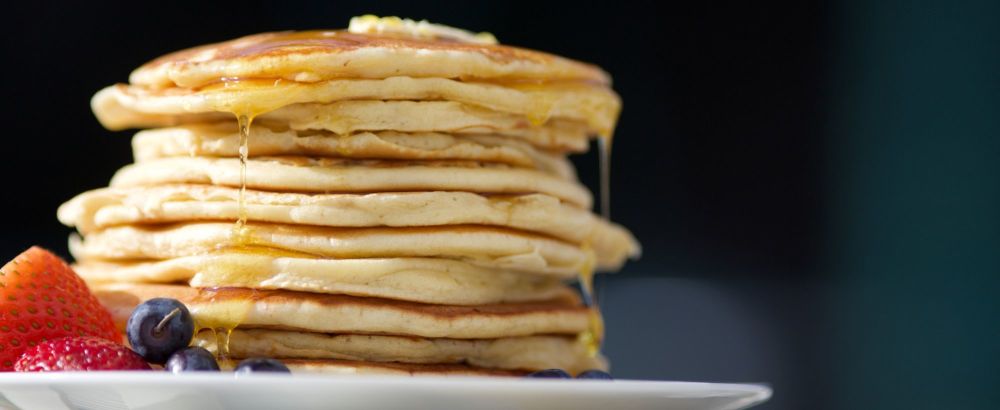SHOULD WE ALL GIVE UP DIETS FOR LENT?
Posted on
Pancake Day leads us into Lent and for Lent, many of us give up something in out diet, or even go on a restrictive diet for a few weeks. But how about following a non-diet approach instead, says Madi Myers ANutr. Let's be more intuitive about what we eat and when…
Photo by Luke Pennystan on Unsplash
Yesterday was Pancake Day, which just happens to be one of my favourite days of the year. An excuse to have pancakes for breakfast, lunch and dinner? Yes please! That means today is Ash Wednesday, otherwise known as the first day of Lent.
Lent is a time of fasting and reflection in the Christian faith, lasting for around six weeks. Originally, followers had a very limited diet for Lent, whereas nowadays people often give up ‘luxury’ or so-called ‘junk’ food. Although my family aren’t religious, we’ve always taken part in Lent. It’s not a religious thing, just a challenge, like Dry January or Veganuary. For as long as I can remember, every year my Dad has given up chocolate or alcohol with my sister and I usually opt to cut out chocolate or more recently all animal products.
You might be curious as to why I’m talking about Lent in a nutrition blog. Well, it has to do with my discovery of the non-diet approach to nutrition a few years ago. Before I knew about the non-diet approach, my pancake day looked like this: stuff as many pancakes as I could into my mouth, smothered in all the things I was about to give up, feel like crap and then spend all of Lent craving these exact things I gave up.
What if this year we gave up diets for Lent instead?
Recently I’ve begun to question why I take part in Lent at all. On reflection, I have tended to use it as an opportunity to impose restrictions on myself, with the aim of losing weight and making my diet healthier. This is just one example of the disordered eating pattern I used to follow; restriction of certain foods, followed by bingeing of said foods and then food guilt and shame.
The non-diet approach, though, teaches that in order to have a healthy diet, you need to have two things:
1 a balanced diet full of a variety of foods and
2 a healthy relationship with food.
There’s a growing body of evidence showing that eating in accordance with our internal signals of hunger and fullness, as with intuitive eating – one facet of the non-diet approach – can be more beneficial for psychological health and for lowering use of disordered eating behaviours. Thereby improving relationship with food.
This is in direct contrast with dieting and restrictive behaviours where external signals, such as diet rules, meal plans, or calorie counting apps, are used to guide eating. This way of eating often has a focus on certain foods being ‘good’ or ‘bad’ and restriction of said ‘bad’ foods which might otherwise give great pleasure. It can be argued that this makes a healthy relationship with food very difficult.
Focus on internal signals
We’re just coming to the end of Sugar-Free February, another well-intentioned health campaign which encourages restriction. But my question is, instead of focusing on what we should take out of our diets, would it be more beneficial to focus on our internal signals of hunger and fullness and what foods really give us satisfaction and pleasure?
For me, Pancake Day doesn’t mean I faceplant into a pile of syrupy pancakes anymore. I no longer follow Lent and can safely say that I have the most pleasant and peaceful relationship with food and my body that I’ve ever had.
Madi Myers
Registered Associate Nutritionist, Non-Diet Nutrition
Madi is a Freelance Nutritionist working in both the food industry and the private sector. She currently writes and holds workshops and cooking classes using the non-diet approach to nutrition.
Twitter @MaudSWM
Further reading:
Hazzard et al (2020). Intuitive eating longitudinally predicts better psychological health and lower use of disordered eating behaviours: findings from EAT 2010-2018. DOI: 10.1007/s40519-020-00852-4
Tribole (2017). Intuitive Eating: Research Update. SCAN'S PULSE. Vol 36, No 3
Tylka et al (2014). The Weight-Inclusive versus Weight-Normative Approach to Health: Evaluating the Evidence for Prioritiing Well-Being over Weight Loss. https://doi.org/10.1155/2014/983495
